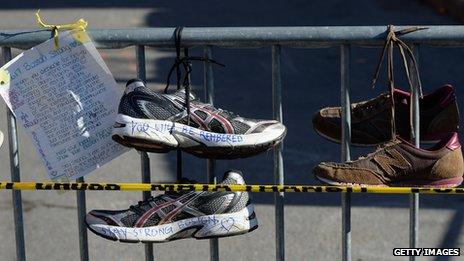Boston attacks reignite debate on Islam and terror
- Published

As Boston mourns those caught up in the bomb attacks on the Marathon, the debate about Islamism and terrorism flares up again in the US
As Boston mourns, external, as Massachusetts holds a minute's silence, the Marathon bombing has reignited a fierce political debate.
It is a hugely sensitive tussle over the nature of Islamist terrorism, external, Islam itself and how America responds to terrorism and a religion it doesn't truly understand, external.
In many ways it is a replay, a reflection, and occasionally a distortion of the major disagreement, external between supporters of George W Bush and Barack Obama.
President Obama's opponents portray him as reluctant to use the word terrorism, overly sympathetic towards Islam, and insufficiently focused on the dangers of violent expressions of militant Islam. On the fringes, some accuse him of being a willing sympathiser, external.
But, more generally, there is a feeling on the right that liberals are too willing to bend over backwards to disconnect the religion from the violence.
This makes liberals hot under the collar, external. They see it as sheer bigotry, and point out that there is in fact no connection between millions of peaceful followers of a religion and a violent fringe.
The refusal of US authorities to read the Boston Marathon bombing suspect his rights is met with differing opinions among Bostonians
It is not a debate restricted to politicians.
I, and I am sure other BBC colleagues, have received quite a lot of messages accusing us of, from one side, wilfully ignoring the role of radical Islam in this attack and, from the other side, saying we are fanning the flames of intolerance.
Some of the attacks on Obama are crudely party political.
He claimed that after the killing of Bin Laden and other major leaders al-Qaeda was "degraded", external and by implication close to collapse.
His enemies say that is untrue, and he has failed. They want to argue that the strong hand of al-Qaeda is behind every attack.
Way of life?
As fundamental is the demand by leading Republicans that the suspect should be questioned as "an enemy combatant", external, even though he is an American citizen. The law allows this if a suspect is connected with al-Qaeda or similar organisations.
In part, that argument is one that goes back much further than Islamist militancy - to John Adams' defence of the British soldiers responsible for the Boston massacre, external, and all the way back to Magna Carta, external.
It is about whether hard-won rights for those accused of crimes can be abandoned when a government or a people feels under threat; if they are a civilised nicety, like good manners, that can be jettisoned in wartime, when the crime is too dreadful.
But it is also about how America looks at acts of terrorism. Many I spoke to in the last week regard attacks like the one at the Boston Marathon as a disgusting, horrific part of modern life.
One man queuing to go into the Red Sox game on Saturday specifically told me the British had got used to living with a threat because of the IRA. He felt America was moving into that phase.
Some think that is defeatist. For them America is at war. That forgotten phrase "war on terror" may come back, external into fashion.
They argue the country has grown forgetful and flabby since 9/11, and that the country should lead a global campaign against an existential threat.
President Obama will resist this. It is alien to his world view and distracts from his domestic agenda.
But if the rest of the year turns into the rehashing of a debate that had largely been buried, he will have lost.